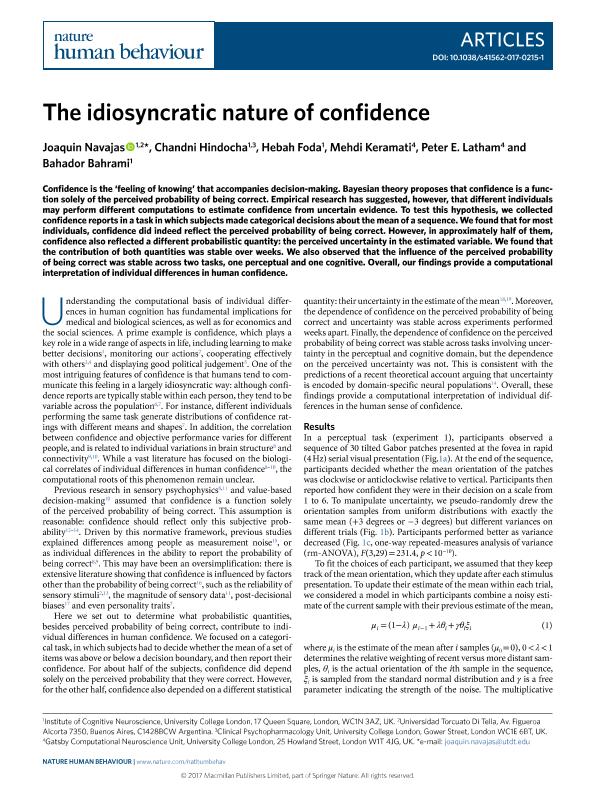Mostrar el registro sencillo del ítem
dc.contributor.author
Navajas Ahumada, Joaquin Mariano

dc.contributor.author
Hindocha, Chandni
dc.contributor.author
Foda, Hebah
dc.contributor.author
Keramati, Mehdi
dc.contributor.author
Latham, Peter E.
dc.contributor.author
Bahrami, Bahador
dc.date.available
2019-10-02T14:50:54Z
dc.date.issued
2017-11
dc.identifier.citation
Navajas Ahumada, Joaquin Mariano; Hindocha, Chandni; Foda, Hebah; Keramati, Mehdi; Latham, Peter E.; et al.; The idiosyncratic nature of confidence; Nature Publishing Group; Nature Human Behaviour; 1; 11; 11-2017; 810-818
dc.identifier.issn
2397-3374
dc.identifier.uri
http://hdl.handle.net/11336/85015
dc.description.abstract
Confidence is the 'feeling of knowing' that accompanies decision-making. Bayesian theory proposes that confidence is a function solely of the perceived probability of being correct. Empirical research has suggested, however, that different individuals may perform different computations to estimate confidence from uncertain evidence. To test this hypothesis, we collected confidence reports in a task in which subjects made categorical decisions about the mean of a sequence. We found that for most individuals, confidence did indeed reflect the perceived probability of being correct. However, in approximately half of them, confidence also reflected a different probabilistic quantity: the perceived uncertainty in the estimated variable. We found that the contribution of both quantities was stable over weeks. We also observed that the influence of the perceived probability of being correct was stable across two tasks, one perceptual and one cognitive. Overall, our findings provide a computational interpretation of individual differences in human confidence.
dc.format
application/pdf
dc.language.iso
eng
dc.publisher
Nature Publishing Group

dc.rights
info:eu-repo/semantics/openAccess
dc.rights.uri
https://creativecommons.org/licenses/by-nc-sa/2.5/ar/
dc.subject
CONFIDENCE
dc.subject
METACOGNITION
dc.subject
COMPUTATIONAL MODELS
dc.subject
INDIVIDUAL DIFFERENCES
dc.subject.classification
Neurociencias

dc.subject.classification
Medicina Básica

dc.subject.classification
CIENCIAS MÉDICAS Y DE LA SALUD

dc.title
The idiosyncratic nature of confidence
dc.type
info:eu-repo/semantics/article
dc.type
info:ar-repo/semantics/artículo
dc.type
info:eu-repo/semantics/publishedVersion
dc.date.updated
2019-10-01T18:10:53Z
dc.journal.volume
1
dc.journal.number
11
dc.journal.pagination
810-818
dc.journal.pais
Reino Unido

dc.journal.ciudad
Londres
dc.description.fil
Fil: Navajas Ahumada, Joaquin Mariano. Consejo Nacional de Investigaciones Científicas y Técnicas; Argentina. University College London; Estados Unidos. Universidad Torcuato Di Tella; Argentina
dc.description.fil
Fil: Hindocha, Chandni. University College London; Estados Unidos
dc.description.fil
Fil: Foda, Hebah. University College London; Estados Unidos
dc.description.fil
Fil: Keramati, Mehdi. University College London; Estados Unidos
dc.description.fil
Fil: Latham, Peter E.. University College London; Estados Unidos
dc.description.fil
Fil: Bahrami, Bahador. University College London; Estados Unidos
dc.journal.title
Nature Human Behaviour
dc.relation.alternativeid
info:eu-repo/semantics/altIdentifier/url/https://www.nature.com/articles/s41562-017-0215-1
dc.relation.alternativeid
info:eu-repo/semantics/altIdentifier/doi/http://dx.doi.org/10.1038/s41562-017-0215-1
Archivos asociados
